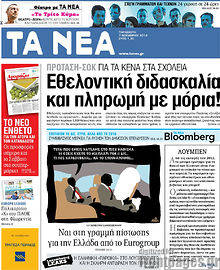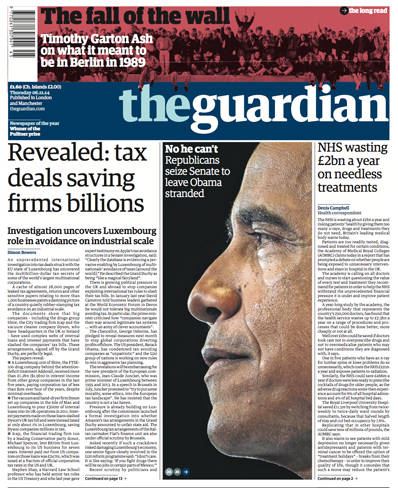
By Costas Efimeros and Nikolas Leontopoulos
In recent years, the fiscal situation in Greece has become one of the favourite subjects of the Greek and world media. In particular, the loss of revenue, a legitimate concern given the country's bad record in tax collecting, soon became an obsession for the troika and the government, fully endorsed by the media.
The cliché of the Greek plumber or tavern-owner on an Aegean island that doesn’t issue receipts monopolised the front pages of Greek and foreign newspapers. But what happens when those that don’t pay their taxes in the debt-ridden country are not plumbers but large business groups?
This is what LuxLeaks is all about: Nine companies linked to powerful Greek businessmen like Spiro Latsis, George David and Dimitris Daskalopoulos and to international business groups like Coca-Cola, Wind Telecom, the Olayan Group and others were ‘caught’, according to the research conducted by the International Consortium of Investigative Journalists (ICIJ), using Luxembourg to avoid paying taxes in Greece.
And what did the Greek and international media that cover Greece do about it? The answer is simple. Nothing. They adopted an eerie silence.
From the very beginning, newspapers and online media have made minimal references to the case, which most probably cost the debt-ridden Greek state revenue losses amounting to hundreds of millions. In the few reports on LuxLeaks, the companies involved are not named. In most cases, the Greek media do not dare to utter the words Coca-Cola, Latsis, Wind, Daskalopoulos, etc.
The omerta is extended to English-speaking media
Since this is an English-speaking analysis, let’s begin with the English-speaking media. Media outlets such as Kathimerini, The TOC, Enikos failed to report on the Greece-associated companies that were involved in LuxLeaks.
As for the foreign media, both the wires (Reuters, Bloomberg, AP) and the big international newspapers that cover Greece comprehensively remained mute. And if for foreign media the reason might be that interest in Greek affairs has dropped and that these companies do not have the same appeal as multinationals like Deutsche Bank and IKEA, the same cannot be said about the Greek English-speaking media.
In some of these, the links with the companies involved are more than obvious. In certain cases it is not a matter of vested interests but of ownership. Thus, for example, the TOC is financed, according to news reports that have never been denied, by the Latsis family (members of which control the EFG Group).
A bright exception (apart from TPP) was journalist Damian Mac Con Uladh and (the now defunct) Enet English.
ICIJ’s media partner in Greece is sabotaging LuxLeaks!
 The newspaper that had the exclusive privilege of cooperating with ICIJ in Greece is Ta Nea, which belongs to the Lambrakis Press Group (DOL), one of the two largest press companies in Greece.
The newspaper that had the exclusive privilege of cooperating with ICIJ in Greece is Ta Nea, which belongs to the Lambrakis Press Group (DOL), one of the two largest press companies in Greece.
Ta Nea is the most popular daily in Greece (despite selling a fraction of what it used to). The stories were reported by Harry Karanikas, the only journalist in Greece who is a member of ICIJ and one of the best investigative reporters in Greece.
Karanikas’s reports on LuxLeaks were excellent – indeed some of TPPI’s coverage of the case was based on them. But DOL and Ta Nea, that have the exclusive story on LuxLeaks, did something incomprehensible: They sabotaged their own exclusive, opting not to mention the names of the companies and the Greek businessmen involved on its front page for as long as the LuxLeaks coverage lasted.
There was one exception in one case. To Vima, DOL’s Sunday flagship paper, chose to publish the revelations about Dimitris Daskalopoulos, former president of the Hellenic Federation of Enterprises (the lobbying group for Greek industrialists) as the cover story on its front page. The problem, of course, is not the front page referring to Daskalopoulos but the fact that other implicated, and equally powerful, businessmen and companies did not make it on the front page: EFG Group (Latsis group), Coca-Cola Hellenic, Wind Telecom, etc.
In most cases, production of investigative journalism in Greece is initiated by vendettas between publishers acting as proxies for powerful businessmen. Even in cases when investigative reports are not ‘ordered’, they are only published to attack the boss’s ‘enemy’.
The problem was intensified during the Greek financial crisis when the so-called ‘oligarchs’ found common ground among each other in order to confront the common enemy – the one that posed the biggest threat to them: the readers.
The evidence: How almost all Greek newspapers buried LuxLeaks
The table below shows the front pages of daily and weekly papers in the four days LuxLeaks were covered. The orange outline shows references to LuxLeaks and the red one shows reports that name specific companies and persons involved in the scandal. The frequency of orange outlines, let alone red ones, visualizes the argument eloquently – just take a peek.

The silence of left-wing papers
In a period when, for the first time in Greek history (and in many ways, European history) there is a strong possibility of a left-wing government, it is disheartening to see that papers of the left have displayed the shortcomings of mainstream media.
For four days, Avgi (a daily affiliated with Syriza) and Rizospastis (a daily affiliated with the Communist Party) avoided to mention LuxLeaks on their front pages and when they did, it was in the form of vague references to ‘Greek interests’ without focusing on the names of the companies and the businessmen involved.
As for Efimerida ton Syntakton, the left-wing newspaper that is owned by a cooperative of journalists, belittled the story by not mentioning the names of implicated companies in their story leads.
Even more worrisome is the case of Dimitris Daskalopoulos. The former president of the Hellenic Federation of Enterprises (the industrialists’ lobbying group – SEV) has been, according to reports, flirting with the political realm of the left. A search of the archive of Avgi and the Efimerida ton Syntakton on Daskalopoulos will come up with his denial of the LuxLeaks scandal published in To Vima, and not the main news story that his investment fund was implicated in LuxLeaks.
Wind Telecom: Τhe media publish a rebuttal of the news without having first published the news
The greek media’s (self) censorship in the coverage of the LuxLeaks scandal is highlighted by yet another incident. When TPP published the LuxLeaks documents about Weather Investments that controlled Wind in 2009, the telecoms company responded with a letter and several tweets, claiming that, in 2009, Weather Investments had withdrawn from Wind.
The rebuttal was posted almost everywhere, even by media that had not run the story on LuxLeaks or had not even mentioned Wind at all. The rebuttal was not fact-checked by journalists before being published.
On the one hand, the evidence published by TPP (official documents of the agreement between Weather Investments and financial authorities in Luxembourg) clearly mentions Wind / Weather Investments / Hellas Telecommunication as the ‘Corporate group’s name’. The same documents contain the name of the ‘vehicle’ companies that served the purpose of concealing the transferred profits (11 companies with different VAT numbers, four of them with Luxembourg VAT numbers).
On the other hand, Wind appears to be consciously lying in its announcement, since, even on its own official website, it states that Weather Investments withdrew on December 16, 2010, meaning that the new management took over in 2011 – two years after the withdrawal date stated in Wind’s rebuttal.
Journalism vs vested interests: The example of The Guardian
 The Guardian Media Group was one of the media organizations that took part in the tax avoidance schemes as revealed by ICIJ through a deal it signed with the Duchy of Luxembourg in 2009.
The Guardian Media Group was one of the media organizations that took part in the tax avoidance schemes as revealed by ICIJ through a deal it signed with the Duchy of Luxembourg in 2009.
And yet on November 6, the British newspaper dedicated half its front page to LuxLeaks. The subject was covered extensively while at the same time its website posted special reports on the importance of the leaks through editorials, stories and interactive infographics. And this was done despite the fact that the Guardian receives advertising from quite a few of the companies implicated in LuxLeaks and despite it too being among them!
This publication has been produced with the assistance of the European Union. The contents of this publication are the sole responsibility of Osservatorio Balcani e Caucaso and its partners and can in no way be taken to reflect the views of the European Union. The project's page: Safety Net for European Journalists. A Transnational Support Network for Media Freedom in Italy and South-east Europe.
